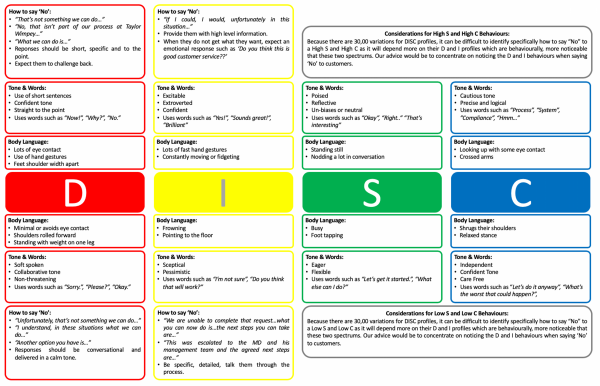How to positively say “no”
There are some people who just won’t take ‘No’ for an answer. You may be thinking “Good for them, never settle.” but sometimes people make demands that simply cannot be met due to limitations. When this happens and these individuals refuse to accept this, they prevent themselves from moving forward towards some kind of resolution that is positive for them. It may not be the result they are looking for but sometimes it’s better than nothing and sometimes, it’s better than expected.
When you come across these individuals, they may be people that you see or work with on a daily basis, such as your team, clients, friends or family. Therefore, for the sake of harmony and a continued relationship, it’s important that in the event you need to tell these people “No” that you try and maintain that relationship by ending the interaction on a positive, whilst being firm in your decision.
It’s about moving the conversation forward, maintaining the relationship and most importantly, not being submissive. You are saying “No” for a reason and you need to assert this.
The Assertiveness Scale
When having discussions where conflict is possible - such as complaints or negotiations - the way you choose to react or adapt to the behaviours the other person is displaying will directly affect the outputs of the conversation. When saying “No” to someone, you need to first identify their level of assertiveness using the below scale:
We can describe the different stages of the scale as below:
Aggression - To describe a person using their frustration in an attempt to control the conversation. For example, they may be threatening legal action and attempt to intimidate or personally criticise the person they are dealing with.
Assertion - To describe a person who is expressing their point of view whilst being respectful of others’ beliefs.
Empathy - To describe a person who listens to understands the other person’s point of view and then chooses whether to concede or assert their own point.
Concede - To describe a person who is very accepting or submits without objection e.g. “I’m so sorry, what can I do for you?”
For those being assertive/aggressive:
When dealing with individuals who are being assertive or aggressive in conversation, you want to confidently say “No” when their request is not possible but show accountability by focusing on other solutions. Possible phrases you could use are:
Whilst that’s not possible, what I can do is…
I can check that for you and in the meantime, I would recommend...
We currently don’t offer that service, but something similar we do offer is...
For those not being assertive and/or concede:
When dealing with individuals who are not assertive and concede their points of view a lot of the time, it’s important to show empathy by acknowledging their point of view and make them feel that they are not being taken advantage of. Possible phrases you could use are:
Thank you for sharing. Let’s consider this on the next one...
Whilst we currently don’t offer that service, I can see how that would be useful…
I think we could use the ideas you suggested on a different matter...
How to Positively Say “No” using DISC
Using DISC, we can identify the individual’s Dominance and Influence behaviours as these are more noticeable and are associated with assertiveness/aggression. We can then use our understanding of DISC methodology to decide how best to respond to high Dominance/Influence behaviours.
We have put together a help sheet to help you identify the other person’s behaviours by looking at their body language and listening to their tone and words being used. We have then offered suggestions on how you could say “No” to these individuals once you have identified their behaviours.
For more information on DISC, please view TTI Success Insights article “DISC: What you need to know”
For similar blogs, please view our blogs tagged with “Entrepreneur Thinking”
For more information on Penguin Learning Ltd, please visit us on LinkedIn


